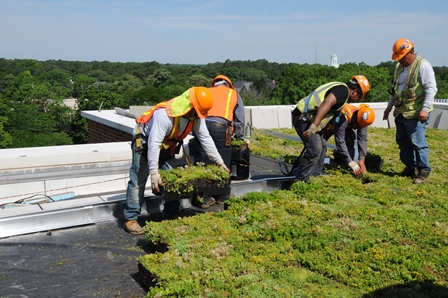Green Roof Installed at Guerrieri Academic Commons
 SALISBURY, MD---From a makeshift Quidditch arena; to the location of fundraisers and festivals; to a place to study, chat or just hangout, Salisbury University’s campus lawns serve thousands of students daily during the semester.
SALISBURY, MD---From a makeshift Quidditch arena; to the location of fundraisers and festivals; to a place to study, chat or just hangout, Salisbury University’s campus lawns serve thousands of students daily during the semester.
A new “lawn” recently planted in connection with SU’s Patricia R. Guerrieri Academic Commons (GAC) will benefit students, as well — though most will never see it, and even fewer will ever set foot on it.
Crews from Green Roof Outfitters of Charleston, SC, recently spent a week at SU to install the GAC’s green roof, a 20,000-square-foot “lawn” atop the building, comprised of a regional blend of plants.
Sitting on a rubber liner in thousands of one-foot-by-two-foot plastic trays, the plants cover a majority of the roof. While rooftop gardens are not new at SU — University Dining Services unveiled an herb garden atop the Commons dining hall in 2013 — the functionality of the GAC’s green roof is unique among SU buildings.
The green roof will act as a collection and filtration system for rainwater landing on the building, absorbing and cleaning the water before a system of stone-and-concrete collectors distributes it back into the ground, significantly reducing runoff. It also will serve as a natural barrier between the roof and the sun, providing an interior cooling effect for the building.
Areas of the roof not covered by the garden, such as those reserved for HVAC or other equipment, will be painted white to reflect the sun, further reducing the amount of heat entering the building from the outside and reducing the urban heat island effect. These measures will allow less energy to be used in cooling the facility.
The GAC was specially designed to support the weight of the green roof, according Wayne Shelton, SU director of campus sustainability and environmental safety. Placing a similar installation atop another building, such as Blackwell Library, whose functions the new facility will replace, structurally would not be possible, he said.
The plants used in the roof are drought-tolerant — some specimens at Green Roof Outfitters’ offices have lasted years without watering — though not all are evergreen.
“Some of it will go dormant seasonally and come back in the warmer weather with the rain,” said Shelton. “The rest of it will stay year-round.”
SU’s Horticulture and Grounds Department will maintain the green roof — but don’t expect to see any riding lawnmowers up there. Any pruning or trimming will be done by hand.
The green roof is just one of the GAC’s sustainable features. Energy-saving LED lights, including several installed on the roof to illuminate maintenance areas, are extensively used. These and other ecologically friendly components built into the structure coincide with SU’s commitment since 2008 to adhere to U.S. Green Building Council Leadership in Energy and Environmental Design (LEED) standards for all new campus construction.
That policy is part of the University’s ongoing commitment to sustainability and President Janet Dudley-Eshbach’s pledge to move the campus toward zero net greenhouse gas emissions with the signing of the American College and University Presidents’ Climate Commitment in 2007.
The $117 million Guerrieri Academic Commons is scheduled to open for the fall semester, serving as a new home for SU’s library, the Edward H. Nabb Research Center for Delmarva History and Culture and other facilities. It is expected to become an academic hub for the campus.
For more information call 410-543-6030 or visit the SU website at www.salisbury.edu.
